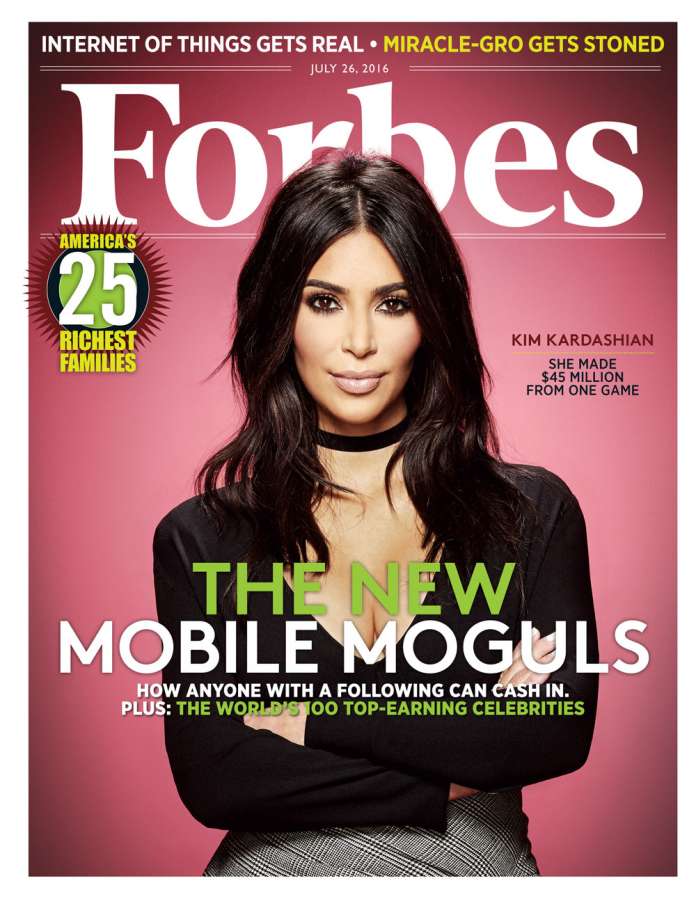As with so many glass-walled boardrooms in West Hollywood, a media mogul sits at the head of the table to do some big-money business. Pencil in hand, Kim Kardashian West flicks through a binder of emoji ideas, finally ticking off a red bandanna, tanning oil and a swimsuit.
“I should take a photo of myself in the Pablo one-piece, and you can use that,” the reality television star says, referring, in the true vertically integrated nature of modern celebrity, to her husband Kanye West’s merchandise line. Later she will Instagram a selfie in the swimsuit that her app developer, Whalerock Industries, will turn into an emoji and include in an app that her fans can download for $1.99.
Kim Kardashian West banked an estimated $51 million pretax this year, largely from digital endeavors.
It’s easy to scoff at this and pretty much everything else Kim Kardashian West does. The embodiment of the selfie era, she has stoked the notoriety she gained from a sex tape a decade ago by sharing almost every detail of her life, begetting, like some nightmare mash-up of Andy Warhol and Groundhog Day, perpetually more fame.
But in obsessing over the details of an avatar, Kardashian has stumbled into an entirely new way to monetize fame, and she’s been shrewd enough to capitalize on a massive scale. Kardashian stars in a mobile game, Kim Kardashian: Hollywood, in which players create their own celebrity, befriend Kim and work their way onto the A-list.
Vapid, yes, but the numbers look very smart. Since its June 2014 launch Kim Kardashian: Hollywood has been downloaded 45 million times and generated $160 million in revenue. FORBES estimates that Kardashian has pocketed $45 million from it over that period. This year she earned $51 million to land at No. 42 on FORBES’ Celebrity 100 list; 40% of her yearly paycheck came from the game.
She’s not alone. As gaming has moved from consoles to desktops to smartphone apps, the ability to create a marketable game has spread from pro athletes to pretty much anyone with a following. Some are obvious: action hero Jason Statham in a shoot ‘em up game. Football announcer Tony Gonzalez, a former all-pro, coaches personal training sessions. But many are plowing niches at the end of the long tail: Tom Hanks, an avid typewriter collector, built an app that simulates writing on a typewriter, while William Shatner’s Shatoetry composes poetry for purchasers. From pretty much nowhere at the beginning of the decade, celebrity-driven mobile games have become a $200-million-a-year business, FORBES estimates, with at least 30 celebrities–including 12 of the Celebrity 100–either boasting their own mobile game or ready to release one.
“I became really intrigued with the tech world. I started spending a lot of time in San Francisco,” says Kardashian, without a hint of irony. “I realized this is really going to be the next cycle of my career and this is what I want to focus on.”
Spending time in San Francisco, either literally or figuratively, means adapting to Silicon Valley’s payment model. Rather than take a flat licensing fee, the vast majority of celebrities make money from apps the way you might if you managed to get something into the App Store: The more it sells, the more you make. At times, they’ll negotiate a minimum guarantee.
As with most things celebrity, it’s a hits business. Kardashian’s game is a groundbreaker. Comedian Ellen DeGeneres isn’t far behind: She leveraged her smart and goofy persona with Heads Up!, a trivia game that’s been downloaded 25.5 million times and clocked an estimated $25.9 million in sales since its 2013 launch. YouTube videogame commentator PewDiePie–whose game, Legend of the Brofist, allows you to pretend you’re him and fight with cartoon barrels–has a run rate of almost $1 million a month, according to data provider ThinkGaming.
But since the core component of entrepreneurship is risk, the games that fail wind up yielding very little to the celebrity and put pressure on the game producers. In Hollywood, where celebrity socialism still rules, the free market now exists on everyone’s phones.












